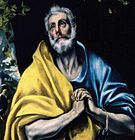Peter's vision of a sheet with animals
| Part of a series of articles on |
| Peter in the Bible |
|---|
 |
| In the New Testament |
| Other |


According to the
At this point in the narrative, messengers sent from Cornelius the Centurion arrive and urge Peter to go with them. He does so, and mentions the vision as he speaks to Cornelius, saying "God hath shewed me that I should not call any man common or unclean" (Acts 10:28). Peter related the vision again in Acts 11:4–9.
Interpretation
As the Book of Acts makes clear, Christians are not obligated to follow this holiness code. This is made clear in Peter's vision in Acts 10:15. Peter is told, 'What God has made clean, do not call common.' In other words, there is no
koshercode for Christians. Christians are not concerned with eating kosher foods and avoiding all others. That part of the law is no longer binding, and Christians can enjoy shrimp and pork with no injury to conscience.
Luke Timothy Johnson and Daniel J. Harrington write that this episode heralds a radical change in Peter's "identity as a member of God's people,"[3]: 187- but also that "the implication is that all things God created are declared clean by him, and are not affected by human discriminations."[3]: 184
On the other hand, both the Seventh-day Adventist Church and the United Church of God argue that Peter's statement in verse 28 indicates that the divine disclosure reflected only a teaching about people,[4] and not one about food. The United Church of God argues that this is an "often-misunderstood section of the Bible",[5] and that "the puzzling vision could not be annulling God's instructions."[5] As such, Adventists and followers of the UCG traditionally observe the Old Testament dietary restrictions, which, like the still upheld Jewish dietary laws, forbid the consumption of pork, shellfish (including shrimps and lobsters), any carnivores, any herbivores that are not ruminants, and any ruminants that do not have split hooves, among others.
Peter's triple refusal described in Acts 10:16 echoes the denial of Peter described in the Synoptic Gospels.[6][7]
Artistic depictions
Peter's vision was rarely shown in art, but has been illustrated with pen-and-ink drawings by Rembrandt and a variant by his pupil van Hoogstraten. Rembrandt was probably reacting to a painting of the subject by Domenico Fetti which was then in Amsterdam, and is now in Vienna.[8] It also appears in the "Altar of St. Peter" in Seville Cathedral, attributed to Francisco de Zurbarán.[9][10]
References
- ^ ISBN 978-0-8010-5290-3.
- ^ R. Albert Mohler Jr. (May 21, 2012). "The Bible condemns a lot, but here's why we focus on homosexuality". My Take. CNN. Retrieved 2012-05-21.
- ^ ISBN 978-0-8146-5807-9.
- ^ Adventist Review. Vol. 184 Pt 1. Review and Herald Pub. Association. January 2007. p. 47.
- ^ a b What Does the Bible Teach About Clean and Unclean Meats? (PDF). United Church of God. 2008. pp. 12–13. Archived from the original (PDF) on 2015-04-12. Retrieved 2011-08-31.
- ISBN 978-0-8028-4501-6.
- ISBN 978-0-567-04012-1.
- ISBN 978-0-89236-978-2.
- ISSN 0004-3079.
- ^ Réveil, Etienne Achille; Duchesne, Jean (1833). Museum of Painting and Sculpture: Or, Collection of the Principal Pictures, Statues and Bas-reliefs in the Public and Private Galleries of Europe. Vol. 17. Bossange. pp. 364–.
